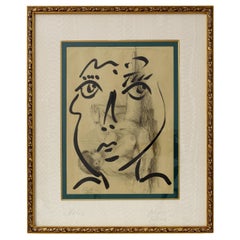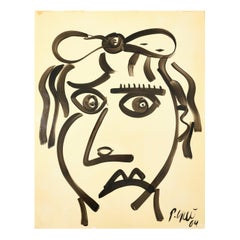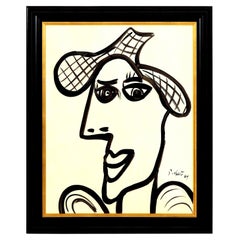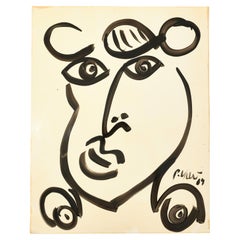Peter Keil Art 1964
Vintage 1960s German Mid-Century Modern Paintings
Acrylic
Vintage 1960s German Mid-Century Modern Paintings
Acrylic
Vintage 1960s German Mid-Century Modern Paintings
Acrylic
Recent Sales
Vintage 1960s German Mid-Century Modern Paintings
Acrylic
People Also Browsed
Vintage 1970s German Modern Paintings
Acrylic
Vintage 1950s German Mid-Century Modern Paintings
Acrylic
Vintage 1950s German Mid-Century Modern Paintings
Acrylic
Vintage 1970s German Modern Paintings
Acrylic
20th Century Modern Figurative Prints
Linocut
Vintage 1970s German Mid-Century Modern Paintings
Acrylic
20th Century American Modern Paintings
Paint
Vintage 1980s German Modern Paintings
Acrylic
Vintage 1980s German Modern Paintings
Acrylic
Vintage 1950s German Modern Paintings
Acrylic
Vintage 1960s German Mid-Century Modern Paintings
Acrylic
Vintage 1970s German Modern Paintings
Acrylic
Vintage 1980s German Modern Paintings
Acrylic
Vintage 1970s German Modern Paintings
Acrylic
Vintage 1970s German Modern Paintings
Acrylic
Vintage 1970s German Modern Paintings
Acrylic
Peter Keil for sale on 1stDibs
In the beginnings of his artistic career, Peter Keil's style was influenced by German Expressionism. In the paintings from his early Berlin years, he mainly focused on typical big city settings and characters on the fringes of society. However, his style changed visibly at the beginning of the 60s when he lived in Paris for a while and emerged in the city's nightlife.
Keil increasingly parted with his realistic approach and developed a new, much more spontaneous and dynamic painting style which he developed further during his years in London and finally during his time as one of the "Berliner Neue Wilden" at the beginning of the 80s. Since then, the use of intensive to lurid colors and the absence of realistic representation have become characteristic of his painting style.
In Keil's paintings, the color is applied with quick brushstrokes and occasionally with impasto techniques and the images are additionally abstracted by the use of graffiti elements. He prefers to paint human figures, portraits, big city scenes, landscapes and still-life images of flowers. His emotional way of painting is mainly driven by a desire for freedom from social constraints and conventions. In the past 50 years, Keil has created numerous large- and small-scale paintings in oil and mixed media on canvas but also some sculptures in wood and steel and a great number of majolicas.
Find original Peter Keil art on 1stDibs.
A Close Look at Mid-century-modern Furniture
Organically shaped, clean-lined and elegantly simple are three terms that well describe vintage mid-century modern furniture. The style, which emerged primarily in the years following World War II, is characterized by pieces that were conceived and made in an energetic, optimistic spirit by creators who believed that good design was an essential part of good living.
ORIGINS OF MID-CENTURY MODERN FURNITURE DESIGN
- Emerged during the mid-20th century
- Informed by European modernism, Bauhaus, International style, Scandinavian modernism and Frank Lloyd Wright’s architecture
- A heyday of innovation in postwar America
- Experimentation with new ideas, new materials and new forms flourished in Scandinavia, Italy, the former Czechoslovakia and elsewhere in Europe
CHARACTERISTICS OF MID-CENTURY MODERN FURNITURE DESIGN
- Simplicity, organic forms, clean lines
- A blend of neutral and bold Pop art colors
- Use of natural and man-made materials — alluring woods such as teak, rosewood and oak; steel, fiberglass and molded plywood
- Light-filled spaces with colorful upholstery
- Glass walls and an emphasis on the outdoors
- Promotion of functionality
MID-CENTURY MODERN FURNITURE DESIGNERS TO KNOW
- Charles and Ray Eames
- Eero Saarinen
- Milo Baughman
- Florence Knoll
- Harry Bertoia
- Isamu Noguchi
- George Nelson
- Danish modernists Hans Wegner and Arne Jacobsen, whose emphasis on natural materials and craftsmanship influenced American designers and vice versa
ICONIC MID-CENTURY MODERN FURNITURE DESIGNS
- Eames lounge chair
- Nelson daybed
- Florence Knoll sofa
- Egg chair
- Womb chair
- Noguchi coffee table
- Barcelona chair
VINTAGE MID-CENTURY MODERN FURNITURE ON 1STDIBS
The mid-century modern era saw leagues of postwar American architects and designers animated by new ideas and new technology. The lean, functionalist International-style architecture of Le Corbusier and Bauhaus eminences Ludwig Mies van der Rohe and Walter Gropius had been promoted in the United States during the 1930s by Philip Johnson and others. New building techniques, such as “post-and-beam” construction, allowed the International-style schemes to be realized on a small scale in open-plan houses with long walls of glass.
Materials developed for wartime use became available for domestic goods and were incorporated into mid-century modern furniture designs. Charles and Ray Eames and Eero Saarinen, who had experimented extensively with molded plywood, eagerly embraced fiberglass for pieces such as the La Chaise and the Womb chair, respectively.
Architect, writer and designer George Nelson created with his team shades for the Bubble lamp using a new translucent polymer skin and, as design director at Herman Miller, recruited the Eameses, Alexander Girard and others for projects at the legendary Michigan furniture manufacturer.
Harry Bertoia and Isamu Noguchi devised chairs and tables built of wire mesh and wire struts. Materials were repurposed too: The Danish-born designer Jens Risom created a line of chairs using surplus parachute straps for webbed seats and backrests.
The Risom lounge chair was among the first pieces of furniture commissioned and produced by celebrated manufacturer Knoll, a chief influencer in the rise of modern design in the United States, thanks to the work of Florence Knoll, the pioneering architect and designer who made the firm a leader in its field. The seating that Knoll created for office spaces — as well as pieces designed by Florence initially for commercial clients — soon became desirable for the home.
As the demand for casual, uncluttered furnishings grew, more mid-century furniture designers caught the spirit.
Classically oriented creators such as Edward Wormley, house designer for Dunbar Inc., offered such pieces as the sinuous Listen to Me chaise; the British expatriate T.H. Robsjohn-Gibbings switched gears, creating items such as the tiered, biomorphic Mesa table. There were Young Turks such as Paul McCobb, who designed holistic groups of sleek, blond wood furniture, and Milo Baughman, who espoused a West Coast aesthetic in minimalist teak dining tables and lushly upholstered chairs and sofas with angular steel frames.
Generations turn over, and mid-century modern remains arguably the most popular style going. As the collection of vintage mid-century modern chairs, dressers, coffee tables and other furniture for the living room, dining room, bedroom and elsewhere on 1stDibs demonstrates, this period saw one of the most delightful and dramatic flowerings of creativity in design history.
Finding the Right Paintings for You
When paired with the perfect frame, the right antique and vintage paintings and other wall decorations can either subtly showcase your personality or steal the show altogether.
The earliest paintings were created on the walls of caves, proving even our ancient ancestors knew that striking artwork is meant to be on display. Cave paintings on an Indonesian island are reportedly older than the earliest cave art in Spain and France, and the figurative paintings back then were produced with inorganic pigments like iron oxide.
Later, the people of Ancient Greece — who learned about art from the Egyptians before them — conceived panel paintings of wax and tempera that were collected and publicly displayed. In the centuries that followed, artists would be commissioned to create large-scale wall murals and frescoed ceilings in sprawling European palaces and in the homes of the aristocracy.
Today, 1stDibs makes it easy for you to celebrate this rich history in your own home. Our collection of paintings includes Art Deco paintings, baroque art and a broad range of other categories. Search by material, period or other attributes to find the right fit — browse an array of 19th century landscape paintings in giltwood frames or abstract oil paintings and portraits made during the 1950s and ‘60s.
An understated contemporary work can complement your space’s color palette without drawing the focus away from the other pivotal design choices you’ve made over the years. Roy Lichtenstein’s Pop art, on the other hand, demands attention with its array of vibrant hues and subjects inspired by popular culture.
Whether you aim to create a gallery in your home or build a single, stunning focal point, you can find what you’re looking for in an extensive inventory of paintings on 1stDibs.



